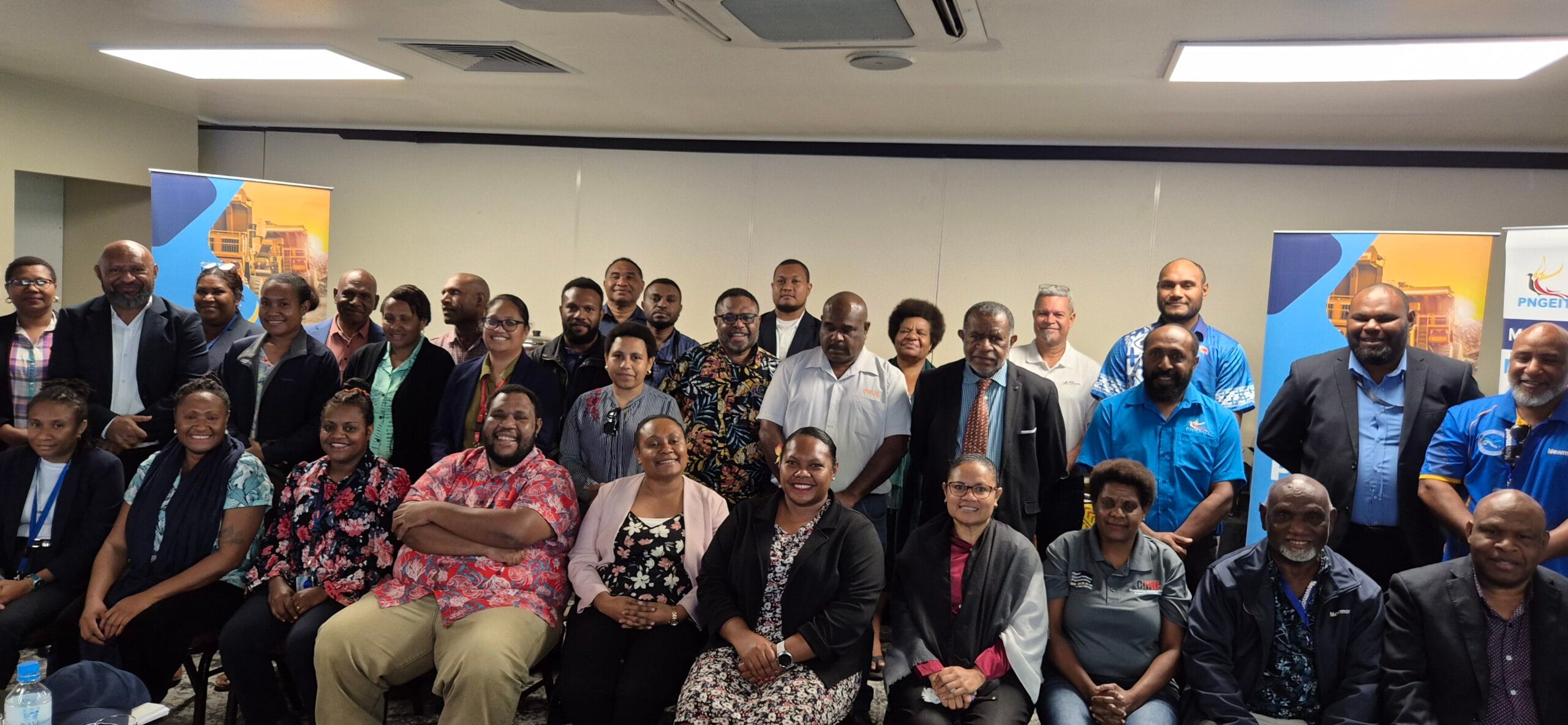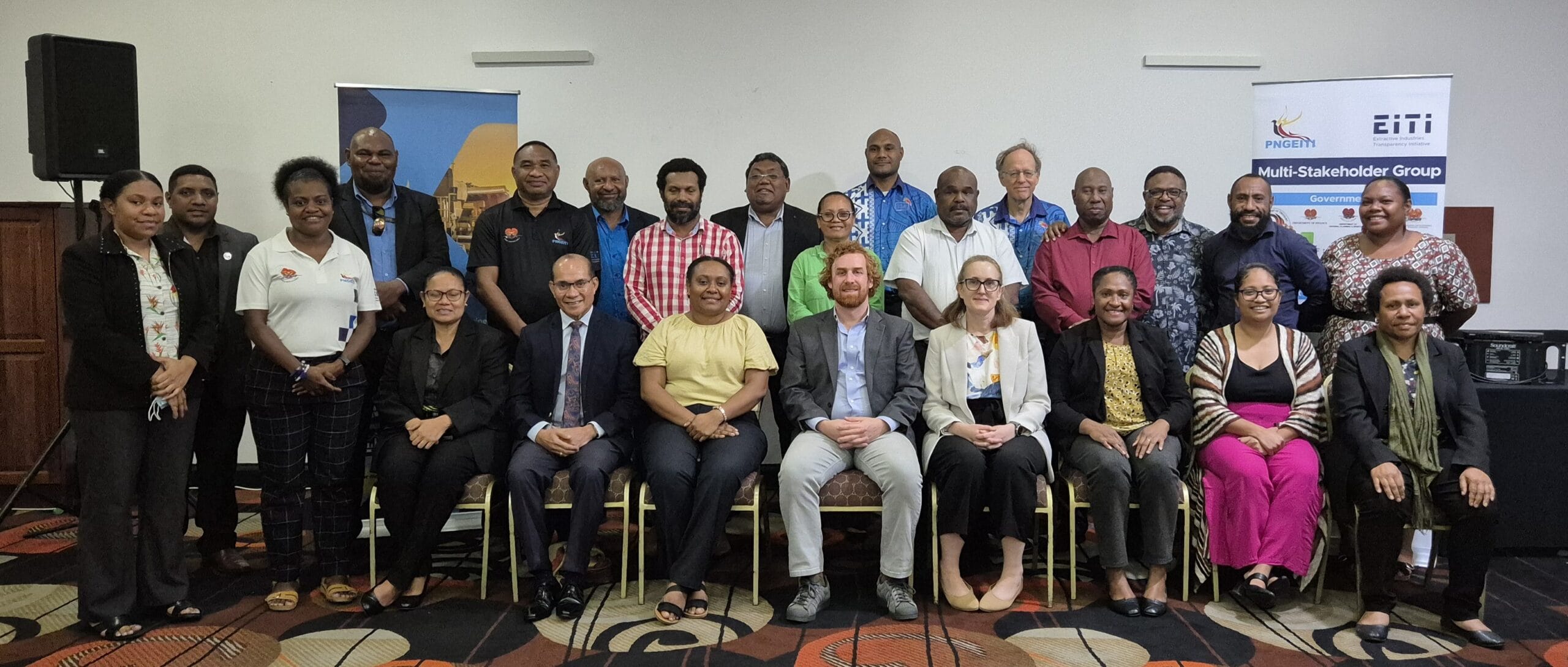improving extractives governance
PNGEITI Report Releases
The EITI holds all implementing countries to the same global standard. Through Validation, the EITI’s quality assurance mechanism, implementing countries are assessed on their ability to meet the provisions of the EITI Standard.

PNGEITI SUPPORTS TIPNG IN THIS YEAR’S WALK AGAINST CORRUPTION.
PNGEITI is proud to support Transparency International PNG in this year’s Sir Anthony Siaguru Walk Against Corruption which took place on June 15. The annual walk brought together citizens, organizations, and business houses in a united stand against corruption. With the 2025 theme “Integrity & Action Now“, the event emphasized the need for immediate, collective efforts to uphold integrity across all sectors of the society. PNGEITI’s sponsorship reflected on its ongoing commitment to promoting transparency, accountability, and ethical practices, particularly within the business and resource sectors. “Supporting events like the Walk Against Corruption reinforces our role as a national platform for good governance,” said George Kauli, Executive Director of PNGEITI. “We commend Transparency International for continuing this important movement and are proud to be part of the call for action,” said Mr. Kauli. The Sir Anthony Siaguru Walk Against Corruption has grown into a national symbol of anti-corruption advocacy, and PNGEITI’s involvement reflects its broader efforts to support integrity-led initiatives across Papua New Guinea. All for a worthy cause, PNGEITI extended its sponsorship to three student groups from Don Bosco Technological Institute to participate in the 2025 Sir Anthony Siaguru walk against corruption. PNGEITI covered registration fees and provided branded shirts and merchandise to support these inspiring young leaders who marched with National Secretariate staff for transparency, honesty, and good governance. Come June 15, PNGEITI staff and students from Don Bosco Technological Institute together with citizens and staff from corporate organizations, institutions and youths took to the streets in the Walk Against Corruption.

PNGEITI HOSTS MSG MEETING, SECOND QUARTER 2025
The PNGEITI Multi-Stakeholder Group (MSG) held its second quarter meeting of 2025 at the Gateway Hotel in Port Moresby on Friday, June 27. The meeting was the first among important EITI agendas for the newly appointed Executive Director, George Kauli. The meeting brought together MSG members and PNGEITI National Secretariat to discuss second quarter meeting agenda, key updates and priorities. Acting MSG Chair and Acting Deputy Secretary, John Uware chaired the meeting. Prior to the discussions on business of the day, Mr. Kauli delivered the Executive Director’s statement in which he thanked the MSG for having confidence in him. The meeting began with the review of matters arising from meeting minutes of first quarter 2025, followed by presentation by two branch directors, Manager Finance & Administration and Officer In-charge of Policy and Programs division. The key highlight of Policy & Programs presentation was the update on the Commission Bill and Project Benefit Sharing Agreements. Communications & Stakeholder Engagements provided update on PNGEITI website, Financial Year 2023 Report Launch and Joint lecturers with University of Technology and University of PNG as part of the Stakeholder engagement activities. Project and Procurement branch provided update on World Bank funded projects so as Phase two of Japanese International Co-orporation Agency projects Finance and Administration presented the update on First Quarter Financial Report, Recruitment of the Executive Director and Revised 2025 Workplan

Papua New Guinea Advances EITI Implementation Readiness with Pre-Validation Workshop in Port Moresby
In a crucial step towards improving transparency and governance in the extractive industries, the Papua New Guinea Extractive Industries Transparency Initiative (PNGEITI) convened a two-day Pre-Validation Workshop from 9–10 June in Port Moresby. The workshop brought together members of the Multi-Stakeholder Group (MSG) and staff from the PNGEITI National Secretariat The two-day workshop was facilitated by Asia Country Manager Ms. Sarah Hayton and Validation expert Mr. Riley Zecca from the EITI International Secretariat’s Validation Team with the primary focus to prepare Papua New Guinea for its upcoming EITI Validation scheduled to commence in January 2026. EITI Validation is a cornerstone of the global Extractive Industries Transparency Initiative (EITI) process. It provides an independent and comprehensive assessment of a country’s performance in disclosing critical extractive sector data—from licensing and production to revenue flows and public spending. For Papua New Guinea, EITI Validation is not merely a compliance measure—it is a vital tool for reform. It fosters informed policy dialogue, builds public trust, strengthens institutional frameworks, and demonstrates the country’s commitment to transparency to investors and development partners. The recent Pre-Validation Workshop was strategically designed to support this reform agenda by explaining the Validation process and agreeing on the preparatory steps that the Multi-Stakeholder Group (MSG) must undertake. It also provided hands-on training for MSG members on the newly introduced Validation templates, reviewed outstanding corrective actions from the 2022 Validation, and developed an action plan to address them. In addition, the workshop focused on building capacity around key disclosures required under the revised 2023 EITI Standard, particularly in emerging areas such as energy transition, gender, and anti-corruption. By the end of the two-day session, MSG members had developed a clearer understanding of the specific actions required to close existing implementation gaps and strengthen Papua New Guinea’s standing ahead of the 2026 EITI Validation. Key outcomes of the workshop included a shared understanding of the critical steps needed to achieve full compliance with the EITI Standard, agreement on roles and responsibilities for addressing corrective actions, and the development of a draft timeline outlining key activities to be undertaken in preparation for the upcoming Validation. Speaking on the significance of the workshop, PNGEITI Executive Director Mr. George Kauli stated “This two-day Pre-Validation Workshop has been a timely and strategic opportunity for us to regroup, refocus, and build a shared understanding of what is required for Papua New Guinea to meet the EITI Standard. As we prepare for Validation in 2026, it is critical that all stakeholders—government, industry, and civil society—are aligned in their roles and responsibilities. Our collective commitment to transparency, accountability, and reform will ensure that the benefits from our extractive sector are managed responsibly and equitably for all Papua New Guineans.” This statement reaffirms PNG’s national commitment to transparency and sets a collaborative tone for the coordinated efforts needed as the country advances toward its next Validation. Papua New Guinea last underwent Validation in 2022, during which the EITI International Board awarded the country an overall score of 70.5 points, indicating a moderate level of progress in implementing the EITI Standard. The score was based on an average of three component areas: While the 2022 results reflected PNG’s strong commitment to transparency, the Validation also identified several gaps—particularly in data accessibility and the completeness of reporting. Addressing these gaps is critical for improved governance and accountability. In a resource-rich country like Papua New Guinea, where the economy is heavily reliant on mineral, oil, and gas revenues, the transparent and equitable management of these resources is essential to achieving sustainable development. The Pre-Validation Workshop has set a clear and structured path forward to enhance good governance, strengthen public oversight, and ensure that the benefits of extractive resources are shared fairly among all Papua New Guineans.

Papua New Guinea Advances EITI Implementation Readiness with Pre-Validation Workshop in Port Moresby
In a crucial step towards improving transparency and governance in the extractive industries, the Papua New Guinea Extractive Industries Transparency Initiative (PNGEITI) convened a two-day Pre-Validation Workshop from 9–10 June in Port Moresby. The workshop brought together members of the Multi-Stakeholder Group (MSG) and staff from the PNGEITI National Secretariat The two-day workshop was facilitated by Asia Country Manager Ms. Sarah Hayton and Validation expert Mr. Riley Zecca from the EITI International Secretariat’s Validation Team with the primary focus to prepare Papua New Guinea for its upcoming EITI Validation scheduled to commence in January 2026. EITI Validation is a cornerstone of the global Extractive Industries Transparency Initiative (EITI) process. It provides an independent and comprehensive assessment of a country’s performance in disclosing critical extractive sector data—from licensing and production to revenue flows and public spending. For Papua New Guinea, EITI Validation is not merely a compliance measure—it is a vital tool for reform. It fosters informed policy dialogue, builds public trust, strengthens institutional frameworks, and demonstrates the country’s commitment to transparency to investors and development partners. The recent Pre-Validation Workshop was strategically designed to support this reform agenda by explaining the Validation process and agreeing on the preparatory steps that the Multi-Stakeholder Group (MSG) must undertake. It also provided hands-on training for MSG members on the newly introduced Validation templates, reviewed outstanding corrective actions from the 2022 Validation, and developed an action plan to address them. In addition, the workshop focused on building capacity around key disclosures required under the revised 2023 EITI Standard, particularly in emerging areas such as energy transition, gender, and anti-corruption. By the end of the two-day session, MSG members had developed a clearer understanding of the specific actions required to close existing implementation gaps and strengthen Papua New Guinea’s standing ahead of the 2026 EITI Validation. Key outcomes of the workshop included a shared understanding of the critical steps needed to achieve full compliance with the EITI Standard, agreement on roles and responsibilities for addressing corrective actions, and the development of a draft timeline outlining key activities to be undertaken in preparation for the upcoming Validation. Speaking on the significance of the workshop, PNGEITI Executive Director Mr. George Kauli stated “This two-day Pre-Validation Workshop has been a timely and strategic opportunity for us to regroup, refocus, and build a shared understanding of what is required for Papua New Guinea to meet the EITI Standard. As we prepare for Validation in 2026, it is critical that all stakeholders—government, industry, and civil society—are aligned in their roles and responsibilities. Our collective commitment to transparency, accountability, and reform will ensure that the benefits from our extractive sector are managed responsibly and equitably for all Papua New Guineans.” This statement reaffirms PNG’s national commitment to transparency and sets a collaborative tone for the coordinated efforts needed as the country advances toward its next Validation. Papua New Guinea last underwent Validation in 2022, during which the EITI International Board awarded the country an overall score of 70.5 points, indicating a moderate level of progress in implementing the EITI Standard. The score was based on an average of three component areas: While the 2022 results reflected PNG’s strong commitment to transparency, the Validation also identified several gaps—particularly in data accessibility and the completeness of reporting. Addressing these gaps is critical for improved governance and accountability. In a resource-rich country like Papua New Guinea, where the economy is heavily reliant on mineral, oil, and gas revenues, the transparent and equitable management of these resources is essential to achieving sustainable development. The Pre-Validation Workshop has set a clear and structured path forward to enhance good governance, strengthen public oversight, and ensure that the benefits of extractive resources are shared fairly among all Papua New Guineans.

Papua New Guinea Advances EITI Implementation Readiness with Pre-Validation Workshop in Port Moresby
In a crucial step towards improving transparency and governance in the extractive industries, the Papua New Guinea Extractive Industries Transparency Initiative (PNGEITI) convened a two-day Pre-Validation Workshop from 9–10 June in Port Moresby. The workshop brought together members of the Multi-Stakeholder Group (MSG) and staff from the PNGEITI National Secretariat The two-day workshop was facilitated by Asia Country Manager Ms. Sarah Hayton and Validation expert Mr. Riley Zecca from the EITI International Secretariat’s Validation Team with the primary focus to prepare Papua New Guinea for its upcoming EITI Validation scheduled to commence in January 2026. EITI Validation is a cornerstone of the global Extractive Industries Transparency Initiative (EITI) process. It provides an independent and comprehensive assessment of a country’s performance in disclosing critical extractive sector data—from licensing and production to revenue flows and public spending. For Papua New Guinea, EITI Validation is not merely a compliance measure—it is a vital tool for reform. It fosters informed policy dialogue, builds public trust, strengthens institutional frameworks, and demonstrates the country’s commitment to transparency to investors and development partners. The recent Pre-Validation Workshop was strategically designed to support this reform agenda by explaining the Validation process and agreeing on the preparatory steps that the Multi-Stakeholder Group (MSG) must undertake. It also provided hands-on training for MSG members on the newly introduced Validation templates, reviewed outstanding corrective actions from the 2022 Validation, and developed an action plan to address them. In addition, the workshop focused on building capacity around key disclosures required under the revised 2023 EITI Standard, particularly in emerging areas such as energy transition, gender, and anti-corruption. By the end of the two-day session, MSG members had developed a clearer understanding of the specific actions required to close existing implementation gaps and strengthen Papua New Guinea’s standing ahead of the 2026 EITI Validation. Key outcomes of the workshop included a shared understanding of the critical steps needed to achieve full compliance with the EITI Standard, agreement on roles and responsibilities for addressing corrective actions, and the development of a draft timeline outlining key activities to be undertaken in preparation for the upcoming Validation. Speaking on the significance of the workshop, PNGEITI Executive Director Mr. George Kauli stated “This two-day Pre-Validation Workshop has been a timely and strategic opportunity for us to regroup, refocus, and build a shared understanding of what is required for Papua New Guinea to meet the EITI Standard. As we prepare for Validation in 2026, it is critical that all stakeholders—government, industry, and civil society—are aligned in their roles and responsibilities. Our collective commitment to transparency, accountability, and reform will ensure that the benefits from our extractive sector are managed responsibly and equitably for all Papua New Guineans.” This statement reaffirms PNG’s national commitment to transparency and sets a collaborative tone for the coordinated efforts needed as the country advances toward its next Validation. Papua New Guinea last underwent Validation in 2022, during which the EITI International Board awarded the country an overall score of 70.5 points, indicating a moderate level of progress in implementing the EITI Standard. The score was based on an average of three component areas: While the 2022 results reflected PNG’s strong commitment to transparency, the Validation also identified several gaps—particularly in data accessibility and the completeness of reporting. Addressing these gaps is critical for improved governance and accountability. In a resource-rich country like Papua New Guinea, where the economy is heavily reliant on mineral, oil, and gas revenues, the transparent and equitable management of these resources is essential to achieving sustainable development. The Pre-Validation Workshop has set a clear and structured path forward to enhance good governance, strengthen public oversight, and ensure that the benefits of extractive resources are shared fairly among all Papua New Guineans.

Papua New Guinea Advances EITI Implementation Readiness with Pre-Validation Workshop in Port Moresby
In a crucial step towards improving transparency and governance in the extractive industries, the Papua New Guinea Extractive Industries Transparency Initiative (PNGEITI) convened a two-day Pre-Validation Workshop from 9–10 June in Port Moresby. The workshop brought together members of the Multi-Stakeholder Group (MSG) and staff from the PNGEITI National Secretariat The two-day workshop was facilitated by Asia Country Manager Ms. Sarah Hayton and Validation expert Mr. Riley Zecca from the EITI International Secretariat’s Validation Team with the primary focus to prepare Papua New Guinea for its upcoming EITI Validation scheduled to commence in January 2026. EITI Validation is a cornerstone of the global Extractive Industries Transparency Initiative (EITI) process. It provides an independent and comprehensive assessment of a country’s performance in disclosing critical extractive sector data—from licensing and production to revenue flows and public spending. For Papua New Guinea, EITI Validation is not merely a compliance measure—it is a vital tool for reform. It fosters informed policy dialogue, builds public trust, strengthens institutional frameworks, and demonstrates the country’s commitment to transparency to investors and development partners. The recent Pre-Validation Workshop was strategically designed to support this reform agenda by explaining the Validation process and agreeing on the preparatory steps that the Multi-Stakeholder Group (MSG) must undertake. It also provided hands-on training for MSG members on the newly introduced Validation templates, reviewed outstanding corrective actions from the 2022 Validation, and developed an action plan to address them. In addition, the workshop focused on building capacity around key disclosures required under the revised 2023 EITI Standard, particularly in emerging areas such as energy transition, gender, and anti-corruption. By the end of the two-day session, MSG members had developed a clearer understanding of the specific actions required to close existing implementation gaps and strengthen Papua New Guinea’s standing ahead of the 2026 EITI Validation. Key outcomes of the workshop included a shared understanding of the critical steps needed to achieve full compliance with the EITI Standard, agreement on roles and responsibilities for addressing corrective actions, and the development of a draft timeline outlining key activities to be undertaken in preparation for the upcoming Validation. Speaking on the significance of the workshop, PNGEITI Executive Director Mr. George Kauli stated “This two-day Pre-Validation Workshop has been a timely and strategic opportunity for us to regroup, refocus, and build a shared understanding of what is required for Papua New Guinea to meet the EITI Standard. As we prepare for Validation in 2026, it is critical that all stakeholders—government, industry, and civil society—are aligned in their roles and responsibilities. Our collective commitment to transparency, accountability, and reform will ensure that the benefits from our extractive sector are managed responsibly and equitably for all Papua New Guineans.” This statement reaffirms PNG’s national commitment to transparency and sets a collaborative tone for the coordinated efforts needed as the country advances toward its next Validation. Papua New Guinea last underwent Validation in 2022, during which the EITI International Board awarded the country an overall score of 70.5 points, indicating a moderate level of progress in implementing the EITI Standard. The score was based on an average of three component areas: While the 2022 results reflected PNG’s strong commitment to transparency, the Validation also identified several gaps—particularly in data accessibility and the completeness of reporting. Addressing these gaps is critical for improved governance and accountability. In a resource-rich country like Papua New Guinea, where the economy is heavily reliant on mineral, oil, and gas revenues, the transparent and equitable management of these resources is essential to achieving sustainable development. The Pre-Validation Workshop has set a clear and structured path forward to enhance good governance, strengthen public oversight, and ensure that the benefits of extractive resources are shared fairly among all Papua New Guineans.

